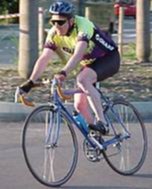 |
 |
 |
 |
 |
 |
|
|

You must know the basics of philosophy. I promise you it's worth it!
Life for a human being is all about philosophy. We are unique among animals
in being self-reflective thinkers, capable of abstract thought. OK, that's
an assumption - who knows what animals are really thinking? Indeed, who
knows what anyone is thinking? Well we know what I am thinking - or at least what I am disclosing - because I can write and you can read. We believe some animals are able to learn signs, but there is doubt about their ability to manipulate symbols to fully express thought. Let's just accept for now that we can fully express ourselves and they can't. What this means is that homo sapiens is able to express itself symbolically and reflect upon what it has expressed. In essence humankind can philosophise. |
|
|
A great time to contemplate philosophy is when you are bike riding...
|
|
If you like what we do at this site please show your support by buying a t-shirt, postcard or coffee mug, or perhaps an image. Or even simply search for a book from Amazon! They are good quality items from excellent providers that I use myself. Cheers, Rob.
![]() Copyright 2005 Robert K. Russell; updated July 6, 2006. Many of the images on this site are for sale, including at higher resolutions
more suitable for printing. They may be purchased and downloaded from my shopfront.
Copyright 2005 Robert K. Russell; updated July 6, 2006. Many of the images on this site are for sale, including at higher resolutions
more suitable for printing. They may be purchased and downloaded from my shopfront.
QuickLinks: Addicted2Wheels Autoexpo 2000 GTVeloce Automotive Gallery GTVeloce.com GTVeloce Image Library Fort Street High School Class of 75 All purpose Chatroom Userplane Chat Fortian Image Gallery 1975 Flora Gallery Miscellaneous Image Gallery Bike Racing Gallery Airliner Gallery Airline Postcard Gallery Gerry's Gallery GTVeloce rave on Alfa Romeos Alfa Gallery Automotive How-to Index Staying Alive Handling 101 Handling 102 Handling 103 Tyrepressures Camber Toe Caster Polar Moment Roll Oversteer Understeer Weight transfer Coil springs Wheels and Tyres Pitch Heel and Toe Double Declutch Offset Rollbars BMEP calculator Cornering load calculator GTVeloce Blog Offline Blog Out Out Damned Blog Addicted2Wheels Blog The Spiel on business MBA Resources HR Resources KM Reframed Bike Racing forum KlausenRussell Com-munity Chain Chatter Unofficial RBCC info Official RBCC info Unofficial CCCC info Official CCCC info Rob's Guide to Road, Crit and Track Racing Rob's Guide, part 2 Track race tips Sydney's Velodromes What do those lines mean? Automobile links Mustknow links Philosophy links Music Links Images of the Russell, Matthews, O'Brien and Brown families in Australia Rob's Amateur Art Gallery The GTVeloce GiftShop The GTVeloce Shopfront Images at Image Tank